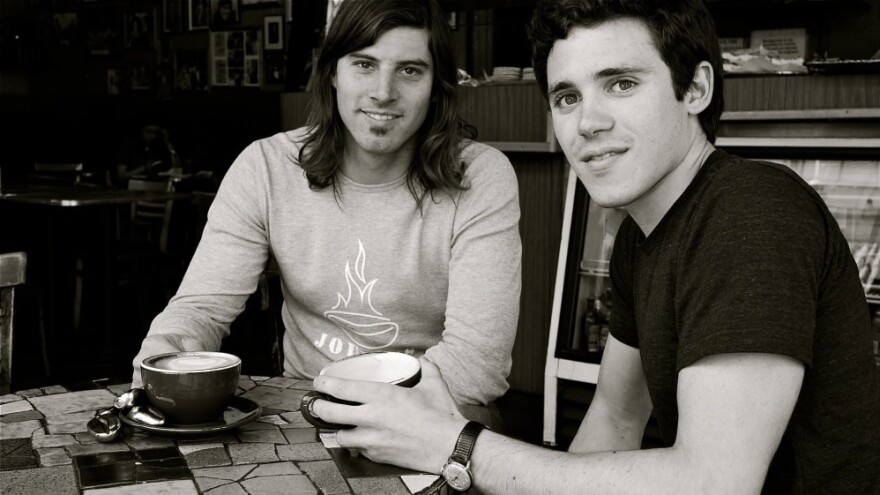The website Kickstarter.com has been around for two years now, helping artists, musicians and filmmakers fund their projects by getting a lot of people to make small donations. Projects that in the past had little hope of getting funding suddenly have the cash they need. Recently, entrepreneurs have started using the site to launch new products, something the company's founders never imagined.
The Kickstarter formula is pretty simple and powerful. It starts with an idea, a specific project. Take X-Files: The Musical.
The Colonel Mustard Amateur Attic Theatre Company in Lincoln, Neb., plans to transform X-Files the TV show into X-Files the musical. It's up on Kickstarter right now, and like most projects on the site, its pitch for funding comes in the form of a video.
There's a goal. For X-Files it was $1,500. There's a deadline, usually 30 to 60 days out. Then friends, family and often total strangers back the project with a few bucks, sometimes even thousands of dollars. If a project meets its goal, it gets funded. Otherwise, the backers aren't charged. It's an all-or-nothing situation.
And it works.
"Over 600,000 people have pledged to a project on Kickstarter, to the tune of over $50 million in our first two years," says Yancey Strickler, 32, one of Kickstarter's founders. "Right now it's over $2 million a week that's being pledged to projects."
The company takes a 5 percent cut from each successfully funded project. But unlike grants or loans or record deals, when these projects get funded, there are no strings attached.
"We don't turn down someone because their art is bad," Strickler says from the company's small headquarters on Manhattan's Lower East Side. "We've never told someone to rewrite the third act or to ditch the singer or to lose 10 pounds."
Their main requirement is that project creators reward their backers in a fair way.
Andrew Rose Gregory is trying to raise $9,000 to release his lost album. Well, it's not really lost, but it's been sitting on a shelf for the past year and a half or so.
"It's a modern folk rock setting of the Song of Songs, the book of love poetry from the Hebrew Bible," Gregory says.
Gregory is best known as a member of the Gregory Brothers, the crew behind the wildly popular Auto-Tune the News YouTube videos. But he has been a musician for years, and he sees Kickstarter as a way to finally put out this album he really cares about.
"I was trying to shop it to record labels, but I've just gotten impatient, and now that Kickstarter's really blown up in the last two years, I just think it's a great avenue for me to do it myself in a better way than I've done my albums before," Gregory says.
But artists and musicians aren't the only ones who see opportunity in Kickstarter. Dave Petrillo and David Jackson invented Coffee Joulies, which, placed inside a coffee cup, keep the beverage at the perfect temperature for drinking. Joulies are made of stainless steel formed to look like oversized coffee beans, and they're filled with a temperature-regulating material.
Petrillo and Jackson wanted to raise $10,000 to turn their prototype into a real product. But after their video went viral, they raised more than $300,000.
"This took off really fast, way faster than we thought it was going to," Petrillo says.
Coffee Joulies is now up and running at Sherrill Manufacturing, a silverware factory in upstate New York that was nearly shuttered until Petrillo and Jackson showed up.
"If we weren't on Kickstarter, we'd have to basically build some ourselves, sell them to raise some more money, build some more, and it would have taken at least a year of doing that to get anywhere close to where we are now," Jackson says. "And we just completely leapfrogged that within a month."
These more entrepreneurial projects built around a product have taken Kickstarter by storm in recent months. Kickstarter's Yancey Strickler says the company didn't know what to make of it at first.
"I think our hearts are very much with the small, idiosyncratic arts projects of, you know, some girl in Milwaukee doing something interesting for $500. Or the really imaginative documentary. That's sort of our world," Strickler says. "But I think that these products have brought an interesting element to Kickstarter that has really helped everybody. So I think it's something that we get more comfortable with every day."
What all the projects on Kickstarter have in common is they tell a story — a story about the creators, and their desire to make something, be it a neat gadget or an album or a musical based on a TV show about aliens.
Copyright 2020 NPR. To see more, visit https://www.npr.org. 9(MDAxNDQ2NDAxMDEyNzU2NzM2ODA3ZGI1ZA001))



